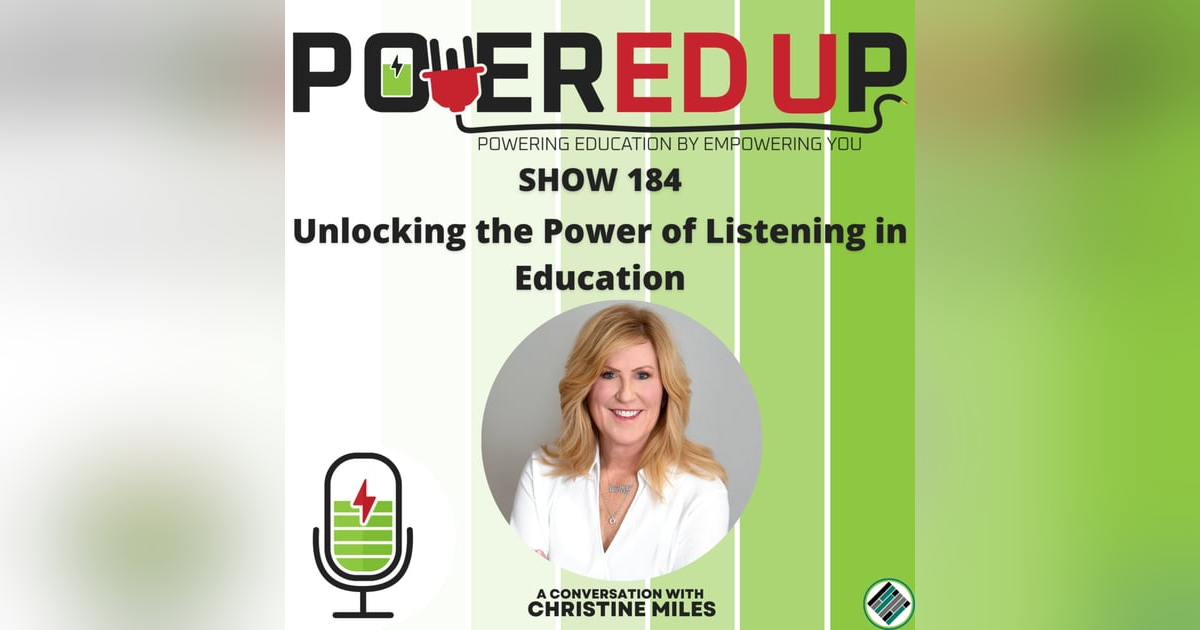184: Unlocking the Power of Listening in Education

In this conversation, Christine Miles emphasizes the critical importance of listening in education and personal interactions. She shares her journey from psychology to education, highlighting how listening has been a foundational skill in her life. The discussion covers various aspects of listening, including its role in classroom settings, strategies for improving listening skills among students, and the significance of comprehension in effective communication. Christine also provides practical tips for educators to enhance their listening abilities and foster better conversations with students and parents. In this conversation, Christine Miles and Ken Ehrmann explore the importance of active listening and empathy in communication, particularly in educational settings. They discuss techniques for engaging listeners, the significance of storytelling, and strategies for teachers to foster better listening habits among students. Christine emphasizes the need for understanding before problem-solving and shares practical tips for navigating conversations effectively. The discussion also highlights the role of humor and vulnerability in teaching, as well as the importance of acknowledging when one is not listening. Overall, the conversation provides valuable insights for educators looking to enhance their communication skills and improve student engagement.
Listening is a foundational skill that can transform interactions.
Effective listening requires training and practice.
Educators can guide students to articulate their thoughts better.
Comprehension is key to effective listening and communication.
Active listening involves summarizing what has been said to ensure understanding.
Listening is not just about hearing; it's about understanding and responding appropriately.
Creating a culture of listening in classrooms enhances student engagement.
Body language plays a crucial role in demonstrating active listening.
Asking the right questions can provoke deeper conversations.
Listening education should be integrated into teaching practices. Empathy is crucial for effective communication.
Understanding must precede problem-solving.
Active listening involves engaging with the speaker's story.
Asking open-ended questions can enhance conversations.
Modeling listening behaviors is essential in classrooms.
Humor can facilitate better learning experiences.
Acknowledging when you're not listening fosters trust.
Celebrating both successes and mistakes is important in education.
Using reflective listening techniques can deepen understanding.
Creating a common language around listening improves classroom dynamics.
Chapters
00:00 The Power of Listening
03:01 Listening as a Skill for Educators
06:09 Guiding Conversations in the Classroom
09:00 Building Listening Skills in Students
12:02 The Importance of Comprehension in Listening
15:03 Training for Effective Listening
18:04 Creating Engaging Conversations
21:12 The Role of Body Language in Listening
24:58 The Power of Empathy in Communication
26:54 Engaging Through Active Listening
29:29 Techniques for Effective Storytelling
32:07 Navigating Conversations with Care
34:35 Strategies for Classroom Listening
39:13 Acknowledging Listening Gaps
40:05 Empowering Educators for Student Success
42:49 Innovative Strategies for Listening in Education
Website: https://www.christinemileslistens.com/
Help us out!
Help us reach new listeners on iTunes by leaving us a rating and review! It takes just 30 seconds, and instructions can be found here. Thanks! We appreciate it!







